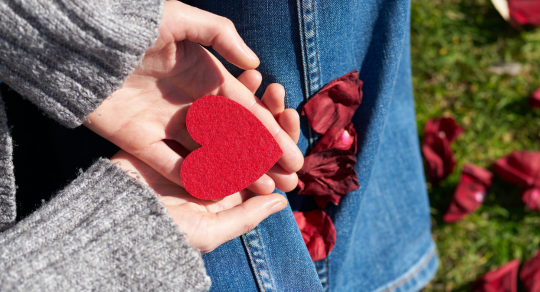How often have you enjoyed a delicious meal with family, festive drink with friends or decadent dessert with yourself—only to feel immediate shame over indulging?
I personally feel less and less guilt around enjoying myself, at the table or elsewhere. But our society’s obsession with weight loss, perfection and generally making us feel less than is very real.
Whether it’s “Keep off those holiday pounds!” “Lose baby weight fast!” or “Burn off the belly bloat!” it’s as if we’re constantly told: “You aren’t skinny, attractive, fit, healthy, or good enough.”
No wonder so many of us feel anxious not just around the holidays, but around any breakfast, lunch or dinner table year-round. Add in beautifully-curated social media accounts bombarding us with #fitspo and #cleaneating posts, and it’s a miracle any of us feel up-to-snuff at all.
Lately, I’ve been embracing a more radical approach to eating. Instead of agonizing over any “pesky pounds” that may result from choosing to be in the present moment and celebrate life, I affectionately call these extra inches “prosperity pounds.”
That’s right: While consciously choosing to increase my intake of vitamin P (for pleasure, of course), my pants can become a little bit tighter.
And rather than beating myself up for indulging while traveling (pizza, pasta and gelato in Italy) or catching up with old friends (who bake irresistible cupcakes), I reframe my slightly curvier figure as a sign of success, abundance, luxury, well-being… you know, the good life.
This isn’t about “letting myself go,” and I have no desire to be overweight. This is simply an act of love for myself. I’m committed to enjoying each moment and giving up the guilt.
Some days that commitment looks like slow walks in nature, instead of a high-intensity sweat fest at the gym. I may not burn as many calories or feel quite as fit, but my body appreciates the rest, and my mind and soul feel nourished. Other days, I can hit the gym all the harder, at ease with myself.
When I’m traveling, I tend to indulge more, eager to experience the culture. I balance that with protein shakes and more fresh fruits and veggies when I return home.
Nutritional psychologist Marc David, MA, says the level of enjoyment we experience in eating our food has very real biochemical consequences that directly affect our metabolism and digestion. “Half of nutrition is what you eat, but the other half is how you eat,” says David, founder of The Institute for the Psychology of Eating and author of The Slow Down Diet: Eating for Pleasure, Energy and Weight Loss (Healing Arts Press, 2005).
David notes that feeling guilty for eating our favorite foods takes away from the pleasure. We all know it’s not healthy to eat ice cream every day, but he believes conscious doses of pleasure put us in a state to honor our desires while nourishing our bodies in a thoughtful way.
I could choose to feel terrible about myself for eating pasta at almost every meal in Italy. Or I can lean into gratitude for the experience of working and traveling in such a magical country. There is so much freedom in enjoying exactly where we are—both geographically in the world and physically in our bodies.
I’m not suggesting anyone make choices that feel unhealthy for them. I’m just asking that we each consider that food and life are meant to be savored and enjoyed—and that the idea of having to choose between pleasure and wellness is wrong. There is a wealth of evidence that focusing on food’s sensual pleasure actually can help you find a healthful balance.
To get the most pleasure from food, I recommend slowing down while you eat, rather than shoveling it in. Remove distractions like the phone and television, so you can eat mindfully.
Be sure to use all your senses to fully experience your food. Appreciate colors, textures, aromas and presentation. Notice every flavor you are tasting, while chewing thoroughly. Studies show that when people eat more slowly, they tend to take in fewer calories and feel just as satisfied. You’ll also digest your food better and absorb more nutrients.
Instead of trying to avoid foods I enjoy, I find it more effective to stop labeling certain foods (and myself) as “bad.” I’m relabeling “forbidden” foods as “fun” foods instead.
Changing our mindset and viewing foods as neutral allows us to make choices based on both health and pleasure. Since I’ve stopped labeling pizza as “bad,” I crave it less—and when I do go for it, I eat a lot less.
I’m finding that eating a balance of nutrient-rich health foods, coupled with some fun foods, is the ultimate healthy diet for me.
And healthy pleasure is something we can all agree on for dinner. Cheers!






